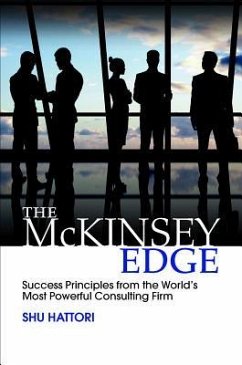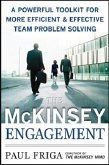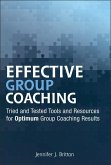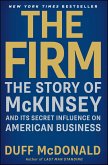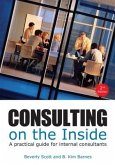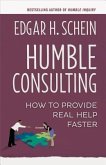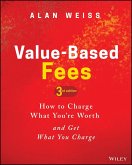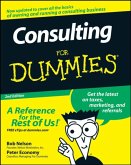Shu Hattori
The McKinsey Edge: Success Principles from the World's Most Powerful Consulting Firm
Shu Hattori
The McKinsey Edge: Success Principles from the World's Most Powerful Consulting Firm
- Gebundenes Buch
- Merkliste
- Auf die Merkliste
- Bewerten Bewerten
- Teilen
- Produkt teilen
- Produkterinnerung
- Produkterinnerung
Former McKinsey and Company consultant Shu Hattori shares 47 strategies for becoming a top corporate leader
Andere Kunden interessierten sich auch für
![The McKinsey Engagement: A Powerful Toolkit For More Efficient and Effective Team Problem Solving The McKinsey Engagement: A Powerful Toolkit For More Efficient and Effective Team Problem Solving]() Paul FrigaThe McKinsey Engagement: A Powerful Toolkit For More Efficient and Effective Team Problem Solving29,99 €
Paul FrigaThe McKinsey Engagement: A Powerful Toolkit For More Efficient and Effective Team Problem Solving29,99 €![Effective Group Coaching Effective Group Coaching]() Jennifer J. Britton (Canada Potentials Realized)Effective Group Coaching44,99 €
Jennifer J. Britton (Canada Potentials Realized)Effective Group Coaching44,99 €![The Firm The Firm]() Duff McDonaldThe Firm20,99 €
Duff McDonaldThe Firm20,99 €![Consulting on the Inside, 2nd Ed.: A Practical Guide for Internal Consultants Consulting on the Inside, 2nd Ed.: A Practical Guide for Internal Consultants]() Beverly ScottConsulting on the Inside, 2nd Ed.: A Practical Guide for Internal Consultants48,99 €
Beverly ScottConsulting on the Inside, 2nd Ed.: A Practical Guide for Internal Consultants48,99 €![Humble Consulting Humble Consulting]() SCHEINHumble Consulting27,99 €
SCHEINHumble Consulting27,99 €![Value-Based Fees Value-Based Fees]() Alan Weiss (Inc. Summit Consulting Group)Value-Based Fees78,99 €
Alan Weiss (Inc. Summit Consulting Group)Value-Based Fees78,99 €![Consulting for Dummies Consulting for Dummies]() Bob Nelson (Inc. Nelson Motivation)Consulting for Dummies22,99 €
Bob Nelson (Inc. Nelson Motivation)Consulting for Dummies22,99 €-
-
-
Former McKinsey and Company consultant Shu Hattori shares 47 strategies for becoming a top corporate leader
Hinweis: Dieser Artikel kann nur an eine deutsche Lieferadresse ausgeliefert werden.
Hinweis: Dieser Artikel kann nur an eine deutsche Lieferadresse ausgeliefert werden.
Produktdetails
- Produktdetails
- Verlag: McGraw-Hill Education
- Seitenzahl: 192
- Erscheinungstermin: 24. November 2015
- Englisch
- Abmessung: 236mm x 156mm x 27mm
- Gewicht: 398g
- ISBN-13: 9781259588686
- ISBN-10: 1259588688
- Artikelnr.: 43155361
- Herstellerkennzeichnung
- Libri GmbH
- Europaallee 1
- 36244 Bad Hersfeld
- gpsr@libri.de
- Verlag: McGraw-Hill Education
- Seitenzahl: 192
- Erscheinungstermin: 24. November 2015
- Englisch
- Abmessung: 236mm x 156mm x 27mm
- Gewicht: 398g
- ISBN-13: 9781259588686
- ISBN-10: 1259588688
- Artikelnr.: 43155361
- Herstellerkennzeichnung
- Libri GmbH
- Europaallee 1
- 36244 Bad Hersfeld
- gpsr@libri.de
Shu Hattori is a Japanese-British national with extensive experience in management consulting, start-ups, online social commerce, and news media.While at McKinsey & Company, he served in advanced industries, high-tech, and media in Asia, North America, and Europe for more than five years. Now, he runs a leadership development start-up. Shu earned an MBA from National Taiwan University with a full government sponsored scholarship and a bachelor's degree in commerce with distinction from McGill University in Canada.
Acknowledgments xi
Introduction 1
CHAPTER ONE: Building the Better Self 9
Get Ahead 10
Principle 1 Focus on What Really Matters 11
Principle 2 Start with the Hard Stuff in the Morning 15
Principle 3 Catch Small Signals and Make a Difference 18
Principle 4 Have a 30- Second Answer to Everything 20
Principle 5 Frontload Your Project 22
Principle 6 Create the Right End Output Image 27
Hang Tight 31
Principle 7 Smile When You Are Under Stress 32
Principle 8 Go Beyond Your Self- Perceived Limit 34
Principle 9 Always Imagine the Worst- Case Scenario 37
Principle 10 Start Following Up 40
Principle 11 Push Back with Less Emotion 42
Multiple Reflections 47
Principle 12 Be Flexible on the Perception of Your Passion 48
Principle 13 "What Would Marvin Do?" Find Your Role Models 51
Principle 14 Know What Gives You the Most Energy in Your Day 54
Principle 15 Go Jogging to Smell the Flowers 57
Principle 16 Create a Commitment Plan 59
Chapter Two: Growing with Others 63
Communication 64
Principle 17 Always Memorize the First Three Sentences of a Presentation 65
Principle 18 Communicate Using Fewer Words 67
Principle 19 Pause Three Seconds Before Answering Difficult Questions 69
Principle 20 Question More and Talk Less 72
Principle 21 Turn No into Yes 75
Principle 22 Don't Show Half- Baked Output 77
Connection 79
Principle 23 Instantly Find a Connection in the Room 80
Principle 24 Be a Giver, Not a Receiver 81
Principle 25 Find the Best Intent in People 83
Principle 26 Learn Team Members' Defining Moments and Personal Sides 85
Principle 27 Think of Everyone as a Helpful Individual, Not a "Resource" 88
Principle 28 Go Out for a Meal with Interesting People Every Week 90
Understanding 93
Principle 29 Consciously Gauge Your People 94
Principle 30 Assign Team Members Meaningful Tasks 96
Principle 31 Create Followership Through Deliberate On- the- Job Coaching
98
Principle 32 Deliver Feedback Using Positive Criticism 100
Principle 33 Please Your Assistants and Support Staff 102
Chapter Three: Excelling in Process Management 105
Productivity Themes and Enablers 106
Principle 34 Always Prepare an Agenda Before Meetings 107
Principle 35 Create "Four Boxes" To Dos 109
Principle 36 Focus on Outcomes Not Activities 111
Principle 37 Know Your Meeting Modes in Advance 114
Principle 38 Proactively Manage E- mail Communication Using the 5D Rules
117
Principle 39 Speak Up as Early as Possible 119
Principle 40 Create a Minimalist Presentation Tool Kit 122
Principle 41 Create an Easy- to- Use Template for Updates 127
Chapter Four: Going the Extra Mile 131
The Challenge to Achieve Lasting Growth 132
Principle 42 Give Away Knowledge and Tools Unsparingly 133
Principle 43 Get Rid of Your Physical Barriers 136
Principle 44 Ask the Second Order Questions 138
Principle 45 Learn to Write Fewer Notes 141
Principle 46 Prepare to Renew Your Life 143
Principle 47 Create Your Own "Profile" as a Leader 146
Chapter Five: Become a Thinker and a Writer 149
Thinking Sets Leaders Apart 149
Marvin Bower on the Value of Writing 151
Appendix I: McKinsey Structure 153
Notes 157
Index 161
Introduction 1
CHAPTER ONE: Building the Better Self 9
Get Ahead 10
Principle 1 Focus on What Really Matters 11
Principle 2 Start with the Hard Stuff in the Morning 15
Principle 3 Catch Small Signals and Make a Difference 18
Principle 4 Have a 30- Second Answer to Everything 20
Principle 5 Frontload Your Project 22
Principle 6 Create the Right End Output Image 27
Hang Tight 31
Principle 7 Smile When You Are Under Stress 32
Principle 8 Go Beyond Your Self- Perceived Limit 34
Principle 9 Always Imagine the Worst- Case Scenario 37
Principle 10 Start Following Up 40
Principle 11 Push Back with Less Emotion 42
Multiple Reflections 47
Principle 12 Be Flexible on the Perception of Your Passion 48
Principle 13 "What Would Marvin Do?" Find Your Role Models 51
Principle 14 Know What Gives You the Most Energy in Your Day 54
Principle 15 Go Jogging to Smell the Flowers 57
Principle 16 Create a Commitment Plan 59
Chapter Two: Growing with Others 63
Communication 64
Principle 17 Always Memorize the First Three Sentences of a Presentation 65
Principle 18 Communicate Using Fewer Words 67
Principle 19 Pause Three Seconds Before Answering Difficult Questions 69
Principle 20 Question More and Talk Less 72
Principle 21 Turn No into Yes 75
Principle 22 Don't Show Half- Baked Output 77
Connection 79
Principle 23 Instantly Find a Connection in the Room 80
Principle 24 Be a Giver, Not a Receiver 81
Principle 25 Find the Best Intent in People 83
Principle 26 Learn Team Members' Defining Moments and Personal Sides 85
Principle 27 Think of Everyone as a Helpful Individual, Not a "Resource" 88
Principle 28 Go Out for a Meal with Interesting People Every Week 90
Understanding 93
Principle 29 Consciously Gauge Your People 94
Principle 30 Assign Team Members Meaningful Tasks 96
Principle 31 Create Followership Through Deliberate On- the- Job Coaching
98
Principle 32 Deliver Feedback Using Positive Criticism 100
Principle 33 Please Your Assistants and Support Staff 102
Chapter Three: Excelling in Process Management 105
Productivity Themes and Enablers 106
Principle 34 Always Prepare an Agenda Before Meetings 107
Principle 35 Create "Four Boxes" To Dos 109
Principle 36 Focus on Outcomes Not Activities 111
Principle 37 Know Your Meeting Modes in Advance 114
Principle 38 Proactively Manage E- mail Communication Using the 5D Rules
117
Principle 39 Speak Up as Early as Possible 119
Principle 40 Create a Minimalist Presentation Tool Kit 122
Principle 41 Create an Easy- to- Use Template for Updates 127
Chapter Four: Going the Extra Mile 131
The Challenge to Achieve Lasting Growth 132
Principle 42 Give Away Knowledge and Tools Unsparingly 133
Principle 43 Get Rid of Your Physical Barriers 136
Principle 44 Ask the Second Order Questions 138
Principle 45 Learn to Write Fewer Notes 141
Principle 46 Prepare to Renew Your Life 143
Principle 47 Create Your Own "Profile" as a Leader 146
Chapter Five: Become a Thinker and a Writer 149
Thinking Sets Leaders Apart 149
Marvin Bower on the Value of Writing 151
Appendix I: McKinsey Structure 153
Notes 157
Index 161
Acknowledgments xi
Introduction 1
CHAPTER ONE: Building the Better Self 9
Get Ahead 10
Principle 1 Focus on What Really Matters 11
Principle 2 Start with the Hard Stuff in the Morning 15
Principle 3 Catch Small Signals and Make a Difference 18
Principle 4 Have a 30- Second Answer to Everything 20
Principle 5 Frontload Your Project 22
Principle 6 Create the Right End Output Image 27
Hang Tight 31
Principle 7 Smile When You Are Under Stress 32
Principle 8 Go Beyond Your Self- Perceived Limit 34
Principle 9 Always Imagine the Worst- Case Scenario 37
Principle 10 Start Following Up 40
Principle 11 Push Back with Less Emotion 42
Multiple Reflections 47
Principle 12 Be Flexible on the Perception of Your Passion 48
Principle 13 "What Would Marvin Do?" Find Your Role Models 51
Principle 14 Know What Gives You the Most Energy in Your Day 54
Principle 15 Go Jogging to Smell the Flowers 57
Principle 16 Create a Commitment Plan 59
Chapter Two: Growing with Others 63
Communication 64
Principle 17 Always Memorize the First Three Sentences of a Presentation 65
Principle 18 Communicate Using Fewer Words 67
Principle 19 Pause Three Seconds Before Answering Difficult Questions 69
Principle 20 Question More and Talk Less 72
Principle 21 Turn No into Yes 75
Principle 22 Don't Show Half- Baked Output 77
Connection 79
Principle 23 Instantly Find a Connection in the Room 80
Principle 24 Be a Giver, Not a Receiver 81
Principle 25 Find the Best Intent in People 83
Principle 26 Learn Team Members' Defining Moments and Personal Sides 85
Principle 27 Think of Everyone as a Helpful Individual, Not a "Resource" 88
Principle 28 Go Out for a Meal with Interesting People Every Week 90
Understanding 93
Principle 29 Consciously Gauge Your People 94
Principle 30 Assign Team Members Meaningful Tasks 96
Principle 31 Create Followership Through Deliberate On- the- Job Coaching
98
Principle 32 Deliver Feedback Using Positive Criticism 100
Principle 33 Please Your Assistants and Support Staff 102
Chapter Three: Excelling in Process Management 105
Productivity Themes and Enablers 106
Principle 34 Always Prepare an Agenda Before Meetings 107
Principle 35 Create "Four Boxes" To Dos 109
Principle 36 Focus on Outcomes Not Activities 111
Principle 37 Know Your Meeting Modes in Advance 114
Principle 38 Proactively Manage E- mail Communication Using the 5D Rules
117
Principle 39 Speak Up as Early as Possible 119
Principle 40 Create a Minimalist Presentation Tool Kit 122
Principle 41 Create an Easy- to- Use Template for Updates 127
Chapter Four: Going the Extra Mile 131
The Challenge to Achieve Lasting Growth 132
Principle 42 Give Away Knowledge and Tools Unsparingly 133
Principle 43 Get Rid of Your Physical Barriers 136
Principle 44 Ask the Second Order Questions 138
Principle 45 Learn to Write Fewer Notes 141
Principle 46 Prepare to Renew Your Life 143
Principle 47 Create Your Own "Profile" as a Leader 146
Chapter Five: Become a Thinker and a Writer 149
Thinking Sets Leaders Apart 149
Marvin Bower on the Value of Writing 151
Appendix I: McKinsey Structure 153
Notes 157
Index 161
Introduction 1
CHAPTER ONE: Building the Better Self 9
Get Ahead 10
Principle 1 Focus on What Really Matters 11
Principle 2 Start with the Hard Stuff in the Morning 15
Principle 3 Catch Small Signals and Make a Difference 18
Principle 4 Have a 30- Second Answer to Everything 20
Principle 5 Frontload Your Project 22
Principle 6 Create the Right End Output Image 27
Hang Tight 31
Principle 7 Smile When You Are Under Stress 32
Principle 8 Go Beyond Your Self- Perceived Limit 34
Principle 9 Always Imagine the Worst- Case Scenario 37
Principle 10 Start Following Up 40
Principle 11 Push Back with Less Emotion 42
Multiple Reflections 47
Principle 12 Be Flexible on the Perception of Your Passion 48
Principle 13 "What Would Marvin Do?" Find Your Role Models 51
Principle 14 Know What Gives You the Most Energy in Your Day 54
Principle 15 Go Jogging to Smell the Flowers 57
Principle 16 Create a Commitment Plan 59
Chapter Two: Growing with Others 63
Communication 64
Principle 17 Always Memorize the First Three Sentences of a Presentation 65
Principle 18 Communicate Using Fewer Words 67
Principle 19 Pause Three Seconds Before Answering Difficult Questions 69
Principle 20 Question More and Talk Less 72
Principle 21 Turn No into Yes 75
Principle 22 Don't Show Half- Baked Output 77
Connection 79
Principle 23 Instantly Find a Connection in the Room 80
Principle 24 Be a Giver, Not a Receiver 81
Principle 25 Find the Best Intent in People 83
Principle 26 Learn Team Members' Defining Moments and Personal Sides 85
Principle 27 Think of Everyone as a Helpful Individual, Not a "Resource" 88
Principle 28 Go Out for a Meal with Interesting People Every Week 90
Understanding 93
Principle 29 Consciously Gauge Your People 94
Principle 30 Assign Team Members Meaningful Tasks 96
Principle 31 Create Followership Through Deliberate On- the- Job Coaching
98
Principle 32 Deliver Feedback Using Positive Criticism 100
Principle 33 Please Your Assistants and Support Staff 102
Chapter Three: Excelling in Process Management 105
Productivity Themes and Enablers 106
Principle 34 Always Prepare an Agenda Before Meetings 107
Principle 35 Create "Four Boxes" To Dos 109
Principle 36 Focus on Outcomes Not Activities 111
Principle 37 Know Your Meeting Modes in Advance 114
Principle 38 Proactively Manage E- mail Communication Using the 5D Rules
117
Principle 39 Speak Up as Early as Possible 119
Principle 40 Create a Minimalist Presentation Tool Kit 122
Principle 41 Create an Easy- to- Use Template for Updates 127
Chapter Four: Going the Extra Mile 131
The Challenge to Achieve Lasting Growth 132
Principle 42 Give Away Knowledge and Tools Unsparingly 133
Principle 43 Get Rid of Your Physical Barriers 136
Principle 44 Ask the Second Order Questions 138
Principle 45 Learn to Write Fewer Notes 141
Principle 46 Prepare to Renew Your Life 143
Principle 47 Create Your Own "Profile" as a Leader 146
Chapter Five: Become a Thinker and a Writer 149
Thinking Sets Leaders Apart 149
Marvin Bower on the Value of Writing 151
Appendix I: McKinsey Structure 153
Notes 157
Index 161

